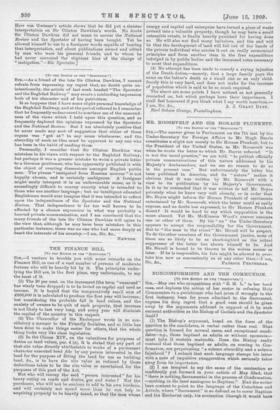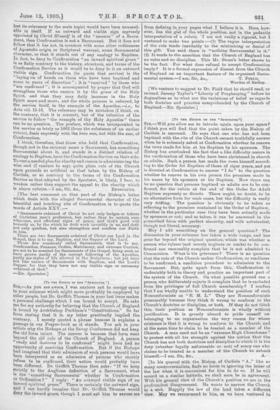NONCONFORMISTS AND THE COMMUNION. 1.TO THZ SZITPR Or TIIR "lifilCITATp10 . 1
SIR,—May one who sympathises with "E. M. L." in her hard case, and deplores the action of her rector in refusing Holy Communion to a parishioner who bad (even if wrongly in the first instance) been for years admitted to the Sacrament, express his deep regret that a good case should be given away by the arguments adduced in eupport of it by such eminent autboritiee as the Bishop of Carlisle and the Spectator itself? (I) The Bishop's argument, based on the form of the (motion to the candidates, is verbal rather than real. That question ie framed for normal cases, and exceptional candi- dates—e.g., those baptised as adults or without sponsors— must take it mutatis ntatandis. Does the Bishop really contend that those baptised as adults, on coming to Con- firmation, are perpetrating "a solemn absurdity and a solemn falsehood "P I submit that such language stamps his letter with a note of impulsive exaggeration which seriously takes away from its importance.
(2) I am tempted to say the same of the contention Bo confidently put forward in your article of May 22nd, that " there is nothing Sacramental in the process of Confirmation, —nothing in the least analogous to Baptism." Had the writer been content to point to the language of the Catechism and Article, where "Sacrament" is so defined as to cover Baptism and the Eucharist only, hiseonteution (though it wctuld hare loot ita relevancy to the main topic) would have been unassail- able in itself. If an outward and visible sign expressly appointed by. Christ Himself is of the "essence" of a Sacra- ;flea, then Confirmation is not a Sacrament. But it does not follow that it has not, in common with some other ordinances Of Apostolic origin, or Scriptural warrant, some Sacramental character, or that it stands out of any analogy to Baptism. In fact, to deny to Confirmation "an inward spiritual grace" is as flatly contrary to the history, structure, and terms of the Confirmation Service as it would be to deny to it an outward visible sign. Confirmation (to quote that service) is the "laying on of hands on those who have been baptised and come to years of discretion " ; it is " reeeived" by those who "are confirmed " ; it is accompanied by prayer that God will strengthen those who receive it by the grace of the Holy Spirit, and that they may daily increase in the Holy Spirit more and more; and the whole process is referred, by the service itself, to the example of the Apostles,--4.e., to Acts viii. 15-18. The reference may be mistaken (I think, on the contrary, that it is correct), but of the intention of the service to follow "the example of thy Holy Apostles" there can be no question. The preface, which was incorporated in the service as lately as 1662 (from the substance of an earlier rubric), deal e expressly with the bane me, not with the ease, of Confirmation.
I think, therefore, that those who hold that Confirmation, though not in the strictest sense a Sacrament, has something Sacramental about it, and stands in a distinct relation of analogy to Baptism,have the Confirmation Service on their side. To rest a needed plea for charity and reason in administering the wise and (I venture to say) quite plain rule of the Church Upon grounds so artificial as that taken by the Bishop of Carlisle, or so contrary to the terms of the Confirmation Service as that adopted by the Speetalor, is likely, I fear, to weaken rather than support the appeal to the charity which
is above rubrics.—I am, Sir, &c., EPISCOPUS.
[The best comment on that part of the Bishop's letter Which deals with the alleged Sacramental character of the beautiful and touching rite of Confirmation is to quote the words of Article XXV. :—
" Sacraments ordained of Christ be not only badges or tokens of Christian men's profession, but rather they be certain sure witnesses, and effectual signs of grace, and God's good will towards us, by the which he cloth work invisibly in us, and cloth not only quicken, but also strengthen and confirm our Faith in him.
There are two Sacraments ordained of Christ our laerd in the Gospel, that is to say, Baptism, and the Supper of the Lord. Those five commonly called Sacraments, that is to say, Confirmation, Penance, Orders, Matrimony, and extreme Unction, are not to be counted for Sacraments of the Gospel, being such as have grown partly of the corrupt following of the Apostles, ,partly are states of life allowed in the Scriptures ; but yet have not like nature of Sacraments with Baptism, and the Lord's Supper, for that they have not any visible sign or ceremony Oroaiped. of Goa."
—ED. Spectator.]











































 Previous page
Previous page